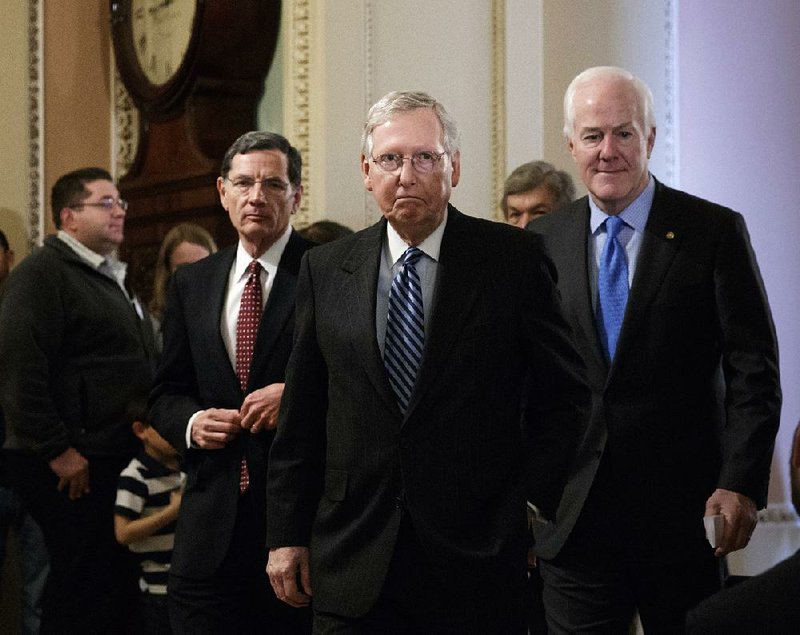WASHINGTON -- Vice President Mike Pence and Health and Human Services Secretary Tom Price went to Capitol Hill on Tuesday to try to salvage the Republican plan to replace the Patient Protection and Affordable Care Act.
There was widespread dissatisfaction with the GOP plan from both House and Senate lawmakers -- conservative and moderate -- after the Congressional Budget Office estimated that 24 million fewer people would have health insurance a decade from now under the American Health Care Act, House Speaker Paul Ryan's effort to significantly change the Affordable Care Act.
President Donald Trump and his team tried Tuesday to shore up support for the legislation by deploying top staff members to meet directly with skeptics and opponents in Congress.
With a House committee vote set for Thursday, Trump's spokesman acknowledged they were open to making changes to win support.
[INTERACTIVE: Compare new health care proposal with Affordable Care Act]
"This has never been a take it or leave it," said spokesman Sean Spicer.
Late Tuesday, members of the Senate Steering Committee -- a conservative coalition chaired by Sen. Mike Lee, R-Utah, who has spoken out against the GOP proposal -- were to meet with Trump's team at the White House, said White House aides.
The president also planned to speak about health care with Ryan and House Majority Leader Kevin McCarthy, R-Calif., by phone Tuesday afternoon, the White House schedule said.
Senate Majority Leader Mitch McConnell, R-Ky., attempted to play down the severity of the GOP split after a private lunch attended by Pence, Price and some of the architects of the House bill, including House Ways and Means Committee Chairman Kevin Brady, R-Texas.
[PRESIDENT TRUMP: Timeline, appointments, executive orders + guide to actions in first 100 days]
After the lunch, McConnell tried to shift the focus from the coverage numbers to more favorable terrain for Republicans: the budget office's projection that Ryan's plan would reduce the federal budget deficit by $337 billion over the next decade and produce a 10 percent average decrease in premiums after that.
"Regarding the projection of fewer people purchasing, I think that's the inevitable result of the government not making you purchase something you may not want," McConnell told reporters. "And so we are hoping to have a more vibrant market that will attract a greater number of people to actually be able to buy, at an affordable cost, insurance that actually makes sense for them rather than one prescribed by the government."
Sen. Bob Corker, R-Tenn., was more guarded than usual leaving the meeting. He declined to discuss specifics but said House leaders and the White House were making a good-faith effort to hear the concerns of Republican senators.
"They really are taking input. So I don't think they would be over here unless they really do want to take input from folks," Corker said.
Sen. Pat Roberts, R-Kan., who also was at the lunch, said, Pence and Price "are open to suggestions and change."
The Budget Office's findings energized Democrats, who already were unanimously opposed to the GOP repeal effort and were showing no sign of relenting.
"Of course you can have savings if you cut off millions of people from access to health care," said House Minority Leader Nancy Pelosi of California. She said the measure's shift of billions of dollars from lower- to higher-earning families essentially would transfer money from GOP to Democratic regions, and, seemingly taunting Republicans, she added, "Explain that to your constituents."
Sen. Ron Wyden, D-Ore., said the report shows "Trumpcare is an awful deal for the American people."
"The CBO report should be a knockout blow for Republicans in Congress," Senate Minority Leader Charles Schumer of New York said. "They should heed this warning and turn back from their plan that would be a disaster for the country."
Mixing and matching
The GOP legislation faces an important test Thursday, when the House Budget Committee meets to combine pieces passed by separate committees into a single bill and advance it to the House floor. The budget panel cannot make substantive changes to the bill, but it can make nonbinding recommendations before it goes to the floor for a final vote.
Several members of the hard-line conservative House Freedom Caucus, which has expressed serious concerns that the measure does not go far enough in repealing the Affordable Care Act, are on the Budget Committee and could decline to support the measure there.
Republicans hold an eight-vote advantage over Democrats on the Budget Committee, and if four GOP members oppose it, the bill could stall. Three of the 22 Republicans on the panel are members of the House Freedom Caucus.
Aides to those three members -- Dave Brat of Virginia, Gary Palmer of Alabama and Mark Sanford of South Carolina -- did not respond to inquiries Tuesday about whether the congressmen intended to support the legislation in committee. Two other Budget Committee Republicans, Reps. John Faso of New York and Bruce Westerman of Arkansas, said Tuesday that they were undecided on their committee votes.
The Budget Committee's sole job is to combine the recommendations of previous committees -- which have passed the GOP proposal -- and send the legislation to the House Rules Committee.
The House Republicans' legislation would keep a few of the Affordable Care Act's most popular features, such as forbidding insurers to deny coverage or charge more to people with pre-existing medical problems and allowing young adults to stay on their parents' insurance policies until age 26. On the other hand, it would wipe out central aspects of the 2010 health care law.
The plan would erase penalties the Affordable Care Act levies on people who violate the requirement that most Americans carry health coverage and, instead, would have a 30 percent surcharge on premiums that insurers could levy for a year if consumers let their coverage lapse.
It also would remove the Affordable Care Act's subsidies for people who cannot get affordable coverage through a job, replacing them with generally smaller tax credits that would be available to people with somewhat higher incomes and give more help to younger adults than older ones. The tax credits could be used for any plan sold in a state, as long as it didn't provide coverage for abortion, rather than plans with specified levels of coverage that are sold through insurances marketplaces created under the law.
The GOP legislation also would make profound changes to Medicaid, the public insurance program for lower-income Americans. Within a few years, the plan would begin eliminating an expansion of the program that three-fifths of the states have adopted under the Affordable Care Act. It would end the traditional system in which each state gets a fixed share of its Medicaid costs, no matter how high. Instead, the government would give states each year a fixed sum per person in the program.
Medicaid concerns
In the Senate, Republicans from states that expanded Medicaid have voiced concerns that the measure does not protect those who obtained coverage through that expansion strongly enough.
They worry that the projected deficit reduction would not be enough of a gain to compensate for the budget office's prediction that 24 million fewer people would have health insurance in a decade.
"These kinds of estimates are going to cause revisions in the bill, almost certainly," Sen. Susan Collins, R-Maine, said Tuesday of the budget office's report. "I don't think that the bill that is being considered now is the bill that ultimately will be the one that we vote on in the Senate."
Sen. Bill Cassidy, R-La., a physician and strong critic of the Affordable Care Act, sounded apprehensive about the budget office's report's implications.
"President Trump said that he wants as many people covered as under 'Obamacare'," Cassidy said Monday. "He said that health care should be affordable. If there's 14 million people losing insurance, of course it's concerning. I try to avoid hyperbole and adjectives, but it's concerning."
In an interview with the conservative radio host Hugh Hewitt, Sen. Tom Cotton, R-Ark., said he did not think the bill would reduce premiums for working people, calling the measure a "flawed bill" with little chance of passage in the House.
"I suspect they don't have anything close to a majority of their members who are willing to vote for this bill now," Cotton said. "I know many of them, and they come from all stripes. They're not just hard-line conservatives. Many of them are centrists, or many of them are just being practical-minded about this bill the way I am."
Cotton also urged House leaders to "pause" and take seriously the budget office's projections on coverage and premiums.
Information for this article was contributed by Kelsey Snell, Elise Viebeck and Mike DeBonis of The Washington Post; by Alan Fram, Alison Noon, Steve Peoples, Ken Thomas and Kevin Freking of The Associated Press; and by Jennifer Steinhauer and Thomas Kaplan of The New York Times.
A Section on 03/15/2017

